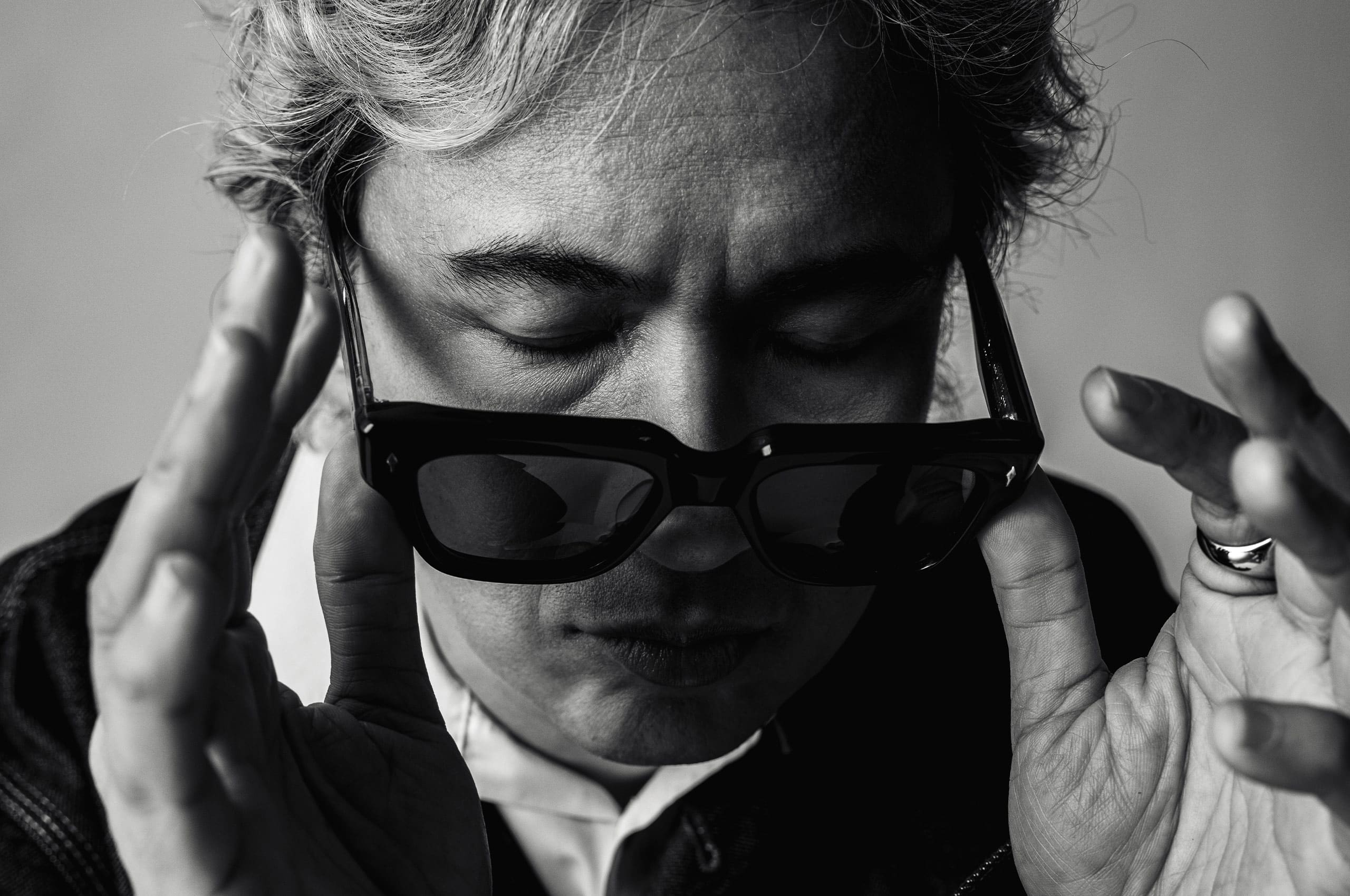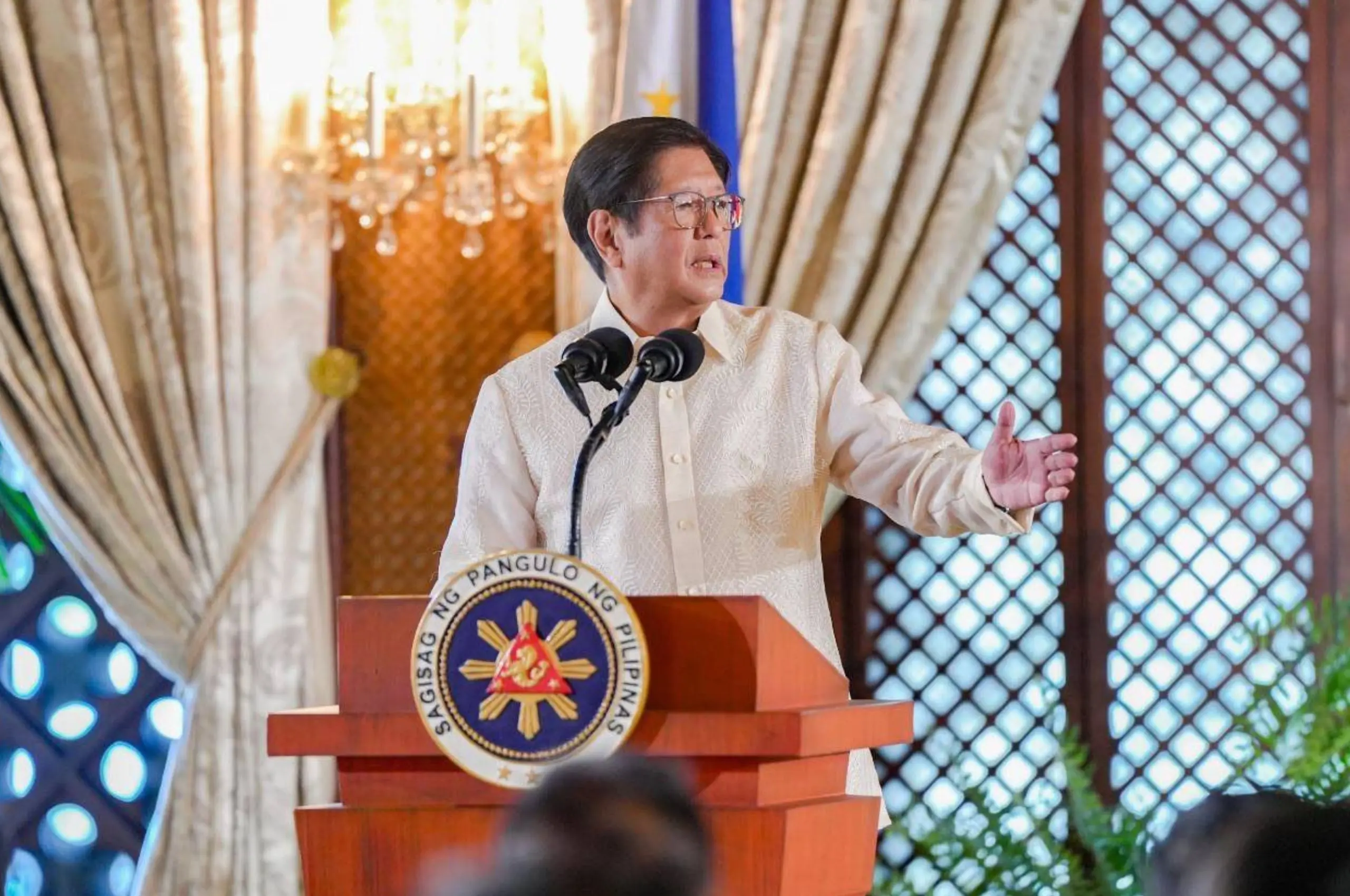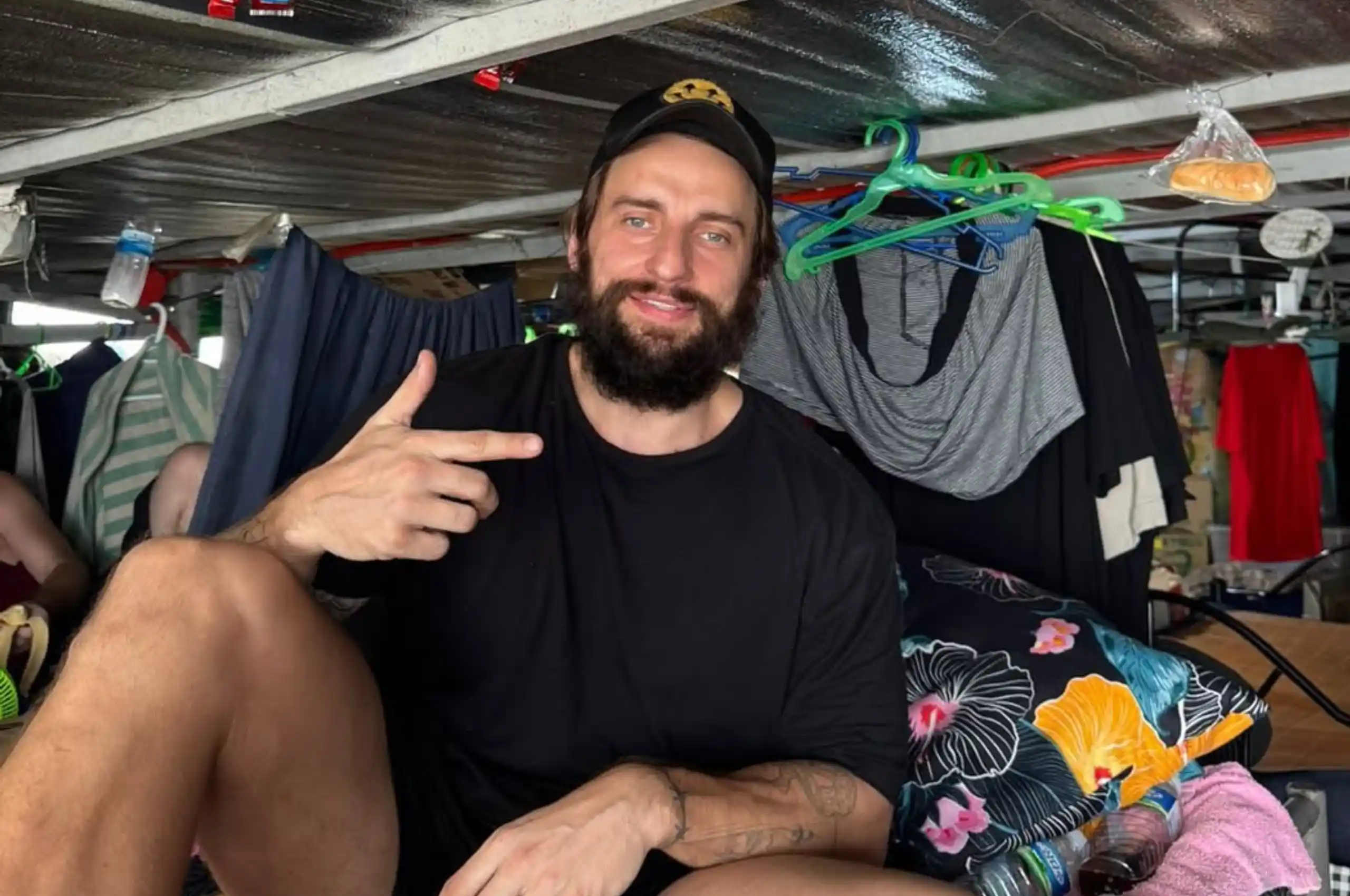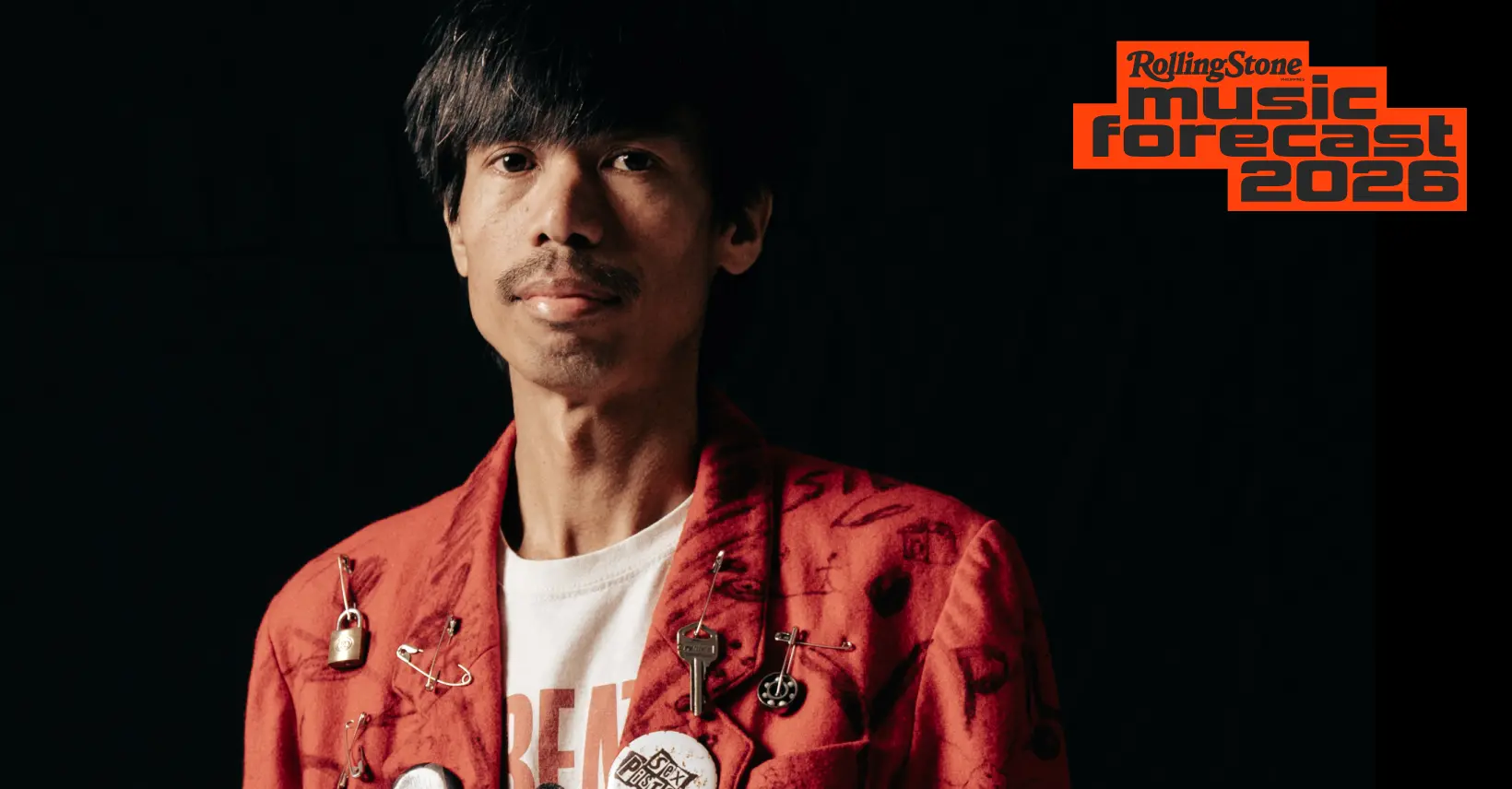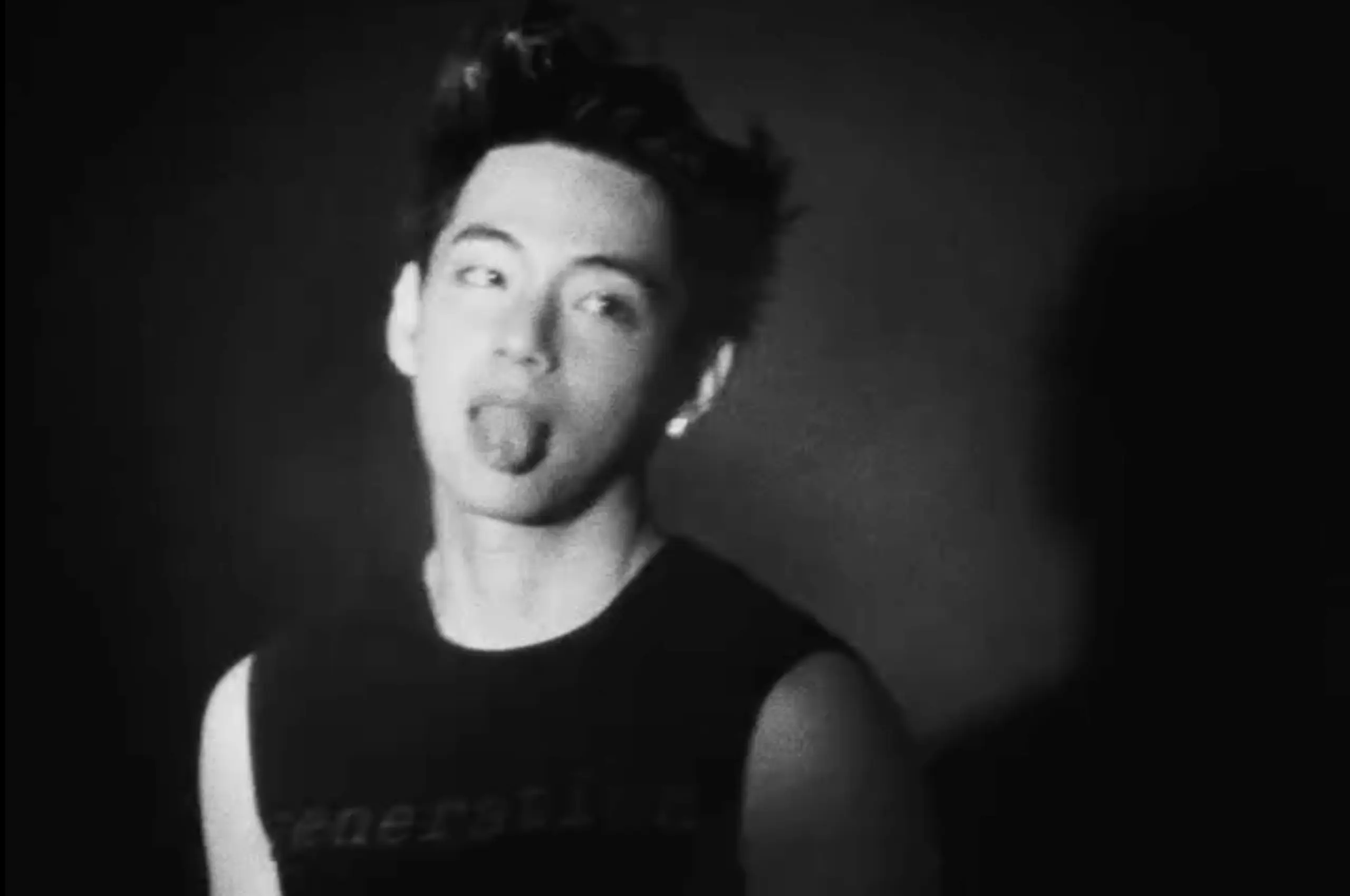For a person often portrayed in the media as “reserved,” Ely Buendia’s presence is magnetic. He arrived on set in a languid posture, hiding behind his orange-tinted glasses. His silver locks are instantly recognizable, and he carries a debonair that only decades of performing on-stage could teach.
“I must warn you, it’s hard to get answers out of Ely,” Buendia’s partner, Audry, cautioned a few days before our shoot. He is someone who matches your energy, she tells us, which makes navigating Buendia a labyrinth for some people.
Throughout his career, Buendia has been pressured to answer for his music. In 2007, on forming his third band Pupil as its vocalist, Buendia said he’d “rather lose all things and start all over again.” On being named an “OPM (Original Pilipino Music) icon,” the title “comes with a price,” he remarked. In 2002, Buendia sent a cryptic text message to his college bandmates from the Eraserheads — considered one of the most influential groups in Filipino music — saying it was time for him, as its frontman, to “graduate.”
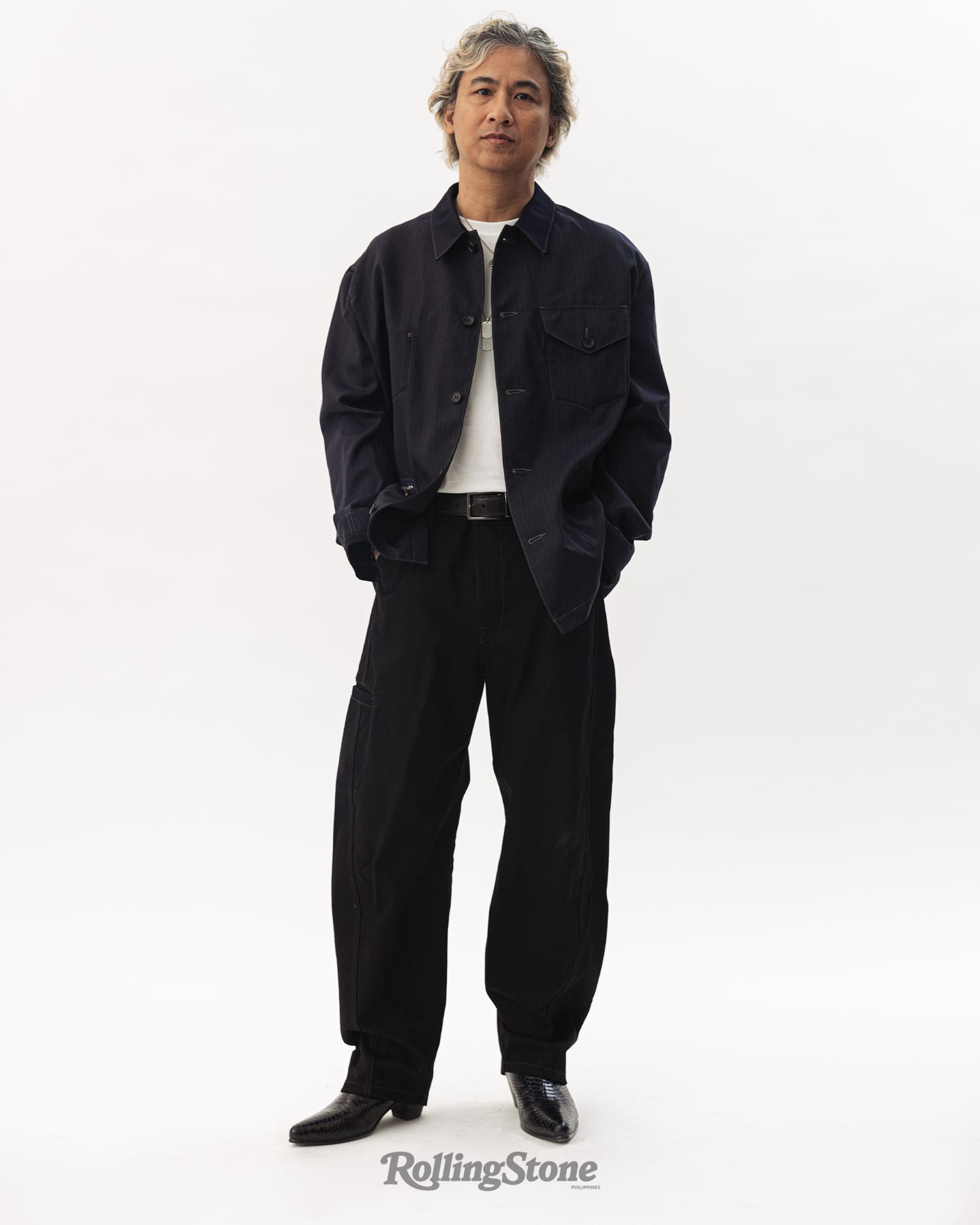
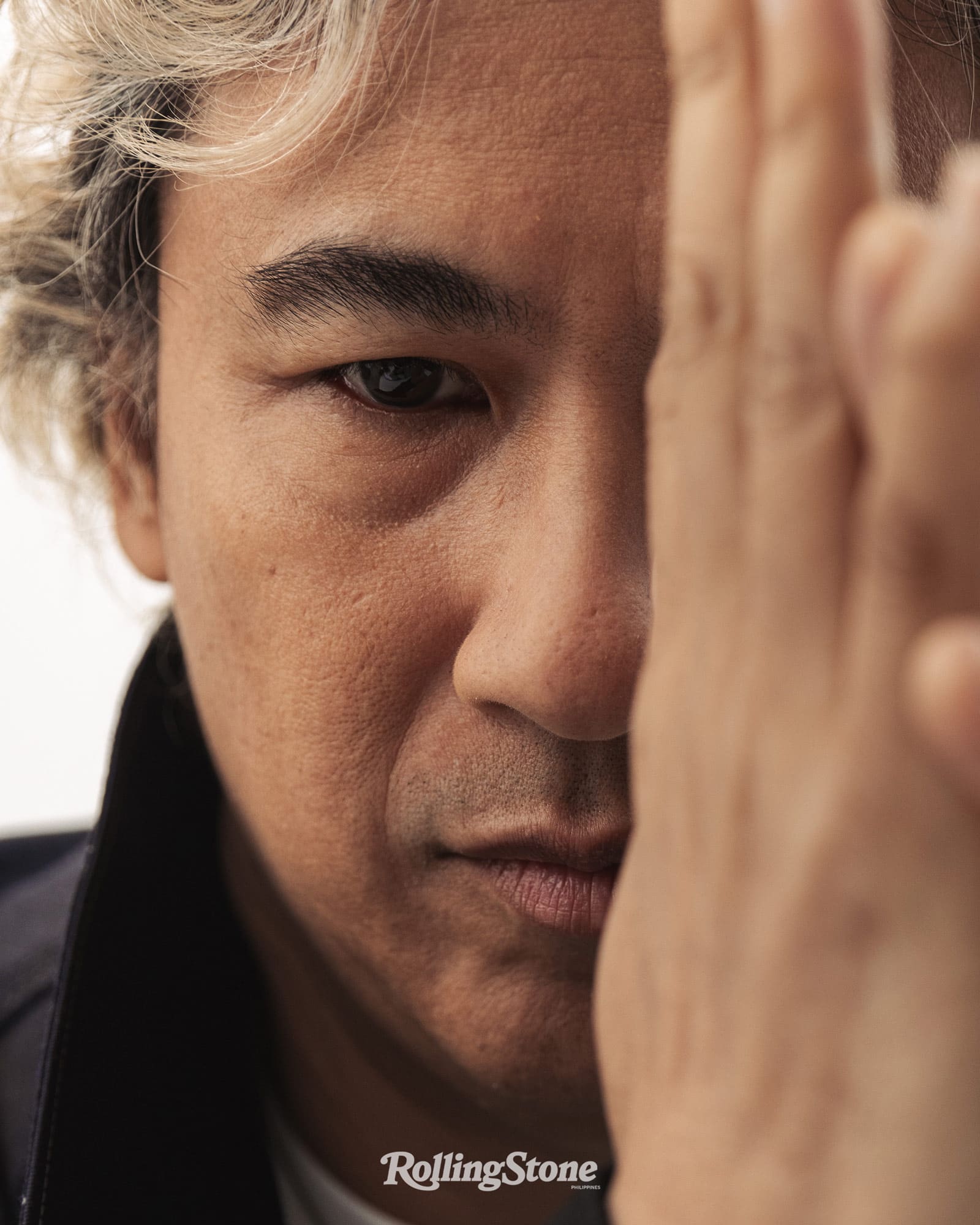
It has taken years for Buendia to step out of Eraserheads’ shadow — not just in the eyes of fans, but also his own. Unlike his debut album Wanted Bedspacer — which was made in his bedroom and by no means a calculated PR move — Buendia considers the newly-released Method Adaptor his first “official” solo album, constituting a critical attempt to reclaim his agency…
…But there is no shaking his synergetic nature, which feeds off the energy of others. Method Adaptor was performed for the first time at 123 Block in Shaw Boulevard, Mandaluyong. As Buendia’s band took center stage, the show opened with Wendy Carlos’ synth rework of “Funeral of Queen Mary March” by Henry Purcell from the film A Clockwork Orange. His band consisted of drummer Pat Sarabia of Apartel, another group formed by Buendia in 2016; Pupil’s guitarist Jerome Velasco; Apartel keyboardist Ryan Goan, and; Bijan Gorospe of Washington Drama Club on bass. A subtle, otherworldly ambience blares through the sound system as the band perform the album from beginning to end: dissonant drones, bleeping laser toms, and guitar delays evoking backmasked, subliminal messages.
I had an epiphany where the only person who could help me was myself.
At the show’s end, Buendia was joined by bands Alyson, Carousel Casualties, Aviators, Pinkmen, and singer-songwriter Ligaya Escueta to sing along to “Bulaklak sa Buwan,” the album’s lead single to a crowd of 600 people. It is a far cry from Eraserheads’ peak, which sold out arenas of up to 100,000 attendees. But this intimate setting — standing alongside contemporaries of this generation — is a return to form for Buendia who, 30 years ago, put everything on the line as a young musician, and is doing it all over again, now at 54, when (self-)perceptions of his art compel an answer from him.
Upon overhearing that I attended his show, Buendia’s piqued interest revealed genuine flattery. He brought an air of effortlessness on set; his earnest attention drawn to small details like the selvedge denim jacket in the wardrobe, which reminded him of riding his motorcycle. The soundtrack of our photoshoot included “Light My Fire,” a classic tune by The Doors, and “Untethered” by High Vis — a post-punk band from London that caught his attention. He bopped his head to the music as he playfully hid behind a black blazer. What some mistake as reservedness may be his way of intentionally engaging with the world around him because there is more to Buendia than his music — an outlet that, at times, has felt like a “burden.”
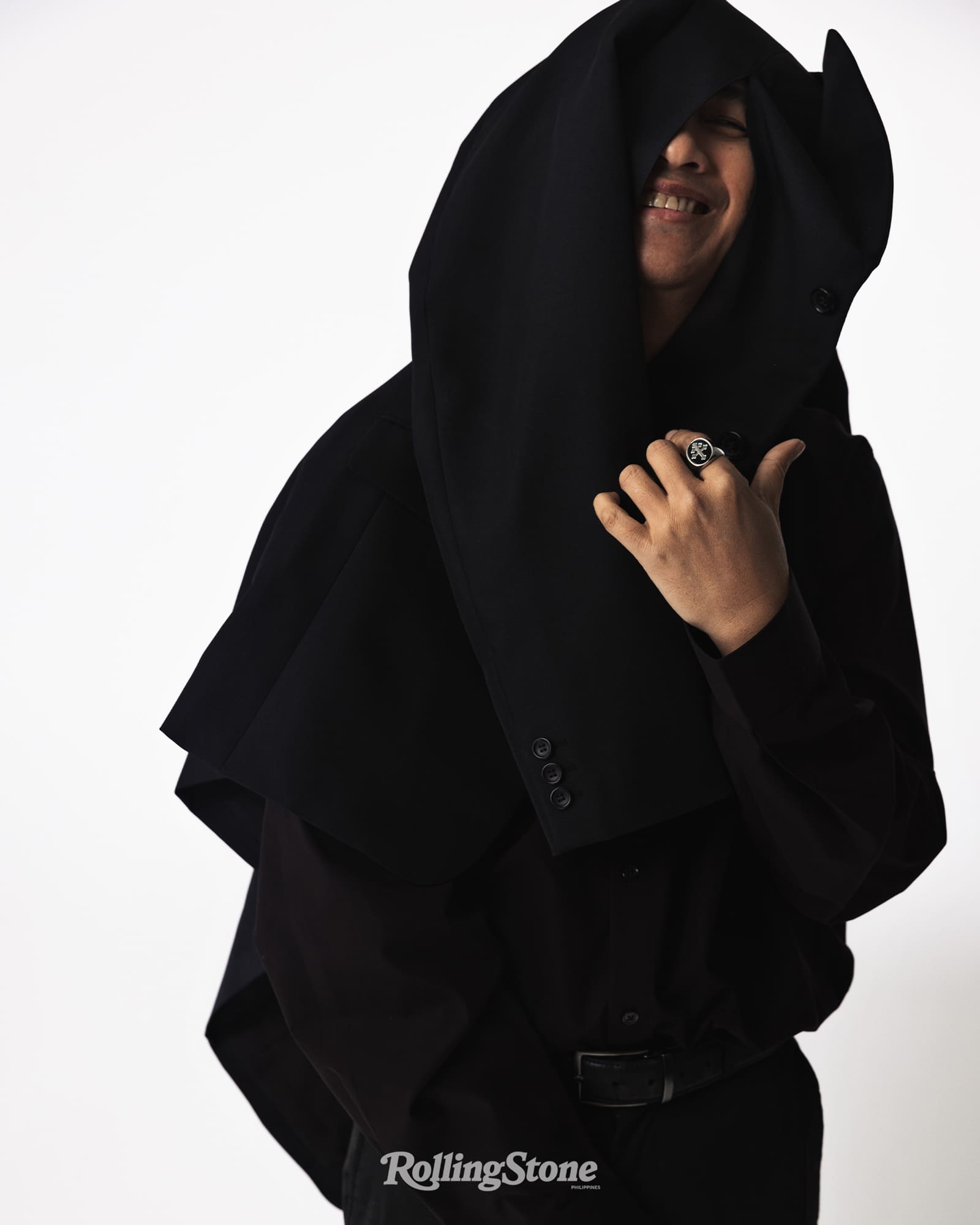
“He’s smiling,” Audry remarks. “That’s rare. That means he’s comfortable.”
In this intimate and multi-faceted interview, Buendia discusses conspiracy theories, his songwriting pet peeves, and who would star in a film adaptation of Method Adaptor, among many other things.
What I’d really like to start this conversation with is your relationship with movies. I’m a film buff myself.
Film is my passion also.
What’s your favorite movie?
Oh, damn. Siguro The Godfather would be up there.
Why?
Do I have to explain? It’s one of the best movies.
Some people like movies because there’s a nostalgic factor…
If you’re talking about nostalgia, I guess it would be Star Wars. Star Wars made me fall in love with movies. But as I grew older and my tastes matured, especially coming from a film student background, I can really appreciate the artistry of The Godfather. It’s just really excellent.
If Star Wars is your creature comfort, what’s a film that’s technically superior to you?
A film that is technically amazing would be 2001: A Space Odyssey. It still holds. You can watch it and you won’t know it’s from the 1960s. The effects, the writing, the direction. It’s really timeless.
What do you think that film is about?
[Laughs] I think it’s about human evolution. And [artificial intelligence], definitely. [Stanley] Kubrick was really into that, ‘di ba?
I noticed you opened your show with the [theme song] of A Clockwork Orange. Why did you choose that track?
You’re probably the only one who noticed that. Even the band didn’t know. I played it to them. They’re like, “What’s this? Is this a classical piece?” I said, “Yes, it’s a classical piece, but it’s from Clockwork.” I was looking for something dramatic, and not rock. I was going through my playlists and when that song played, it sounded perfect for an entrance because that’s how you’re introduced to The Droogs, ‘di ba? It sounded really appropriate.
It’s a very ‘80s sound, too. It’s classical but it’s…
The synth. Yeah. Kasama ‘yon doon. I really love synths now. That ‘80s, Moog [synthesizer] sound na ginamit ni Wendy Carlos sa theme song na ‘yon. Yeah, I love that. She also wrote the soundtrack for the first Tron.
I really respect artists who are there for the sake of art. But for me, the goal is not to perpetuate art or taste, but to contribute to someone else’s life and hopefully get back something in return.
Audry told me that, energy wise, you resonate a lot with David Fincher. Is that true?
Yes, I do. He’s such a risk taker and iconoclast. That’s what I respond to in art. When you look at his films, you immediately know it’s him, ‘di ba? He’s a documentarian in a sense na he tackles social ills head on.
What’s your favorite Fincher film?
Fight Club. The Social Network, I really enjoyed.
What did you like about it?
It’s tricky, making a talking movie. When you hold audiences’ attention just by the script alone, you know the director has talent. And Fincher is one of them.
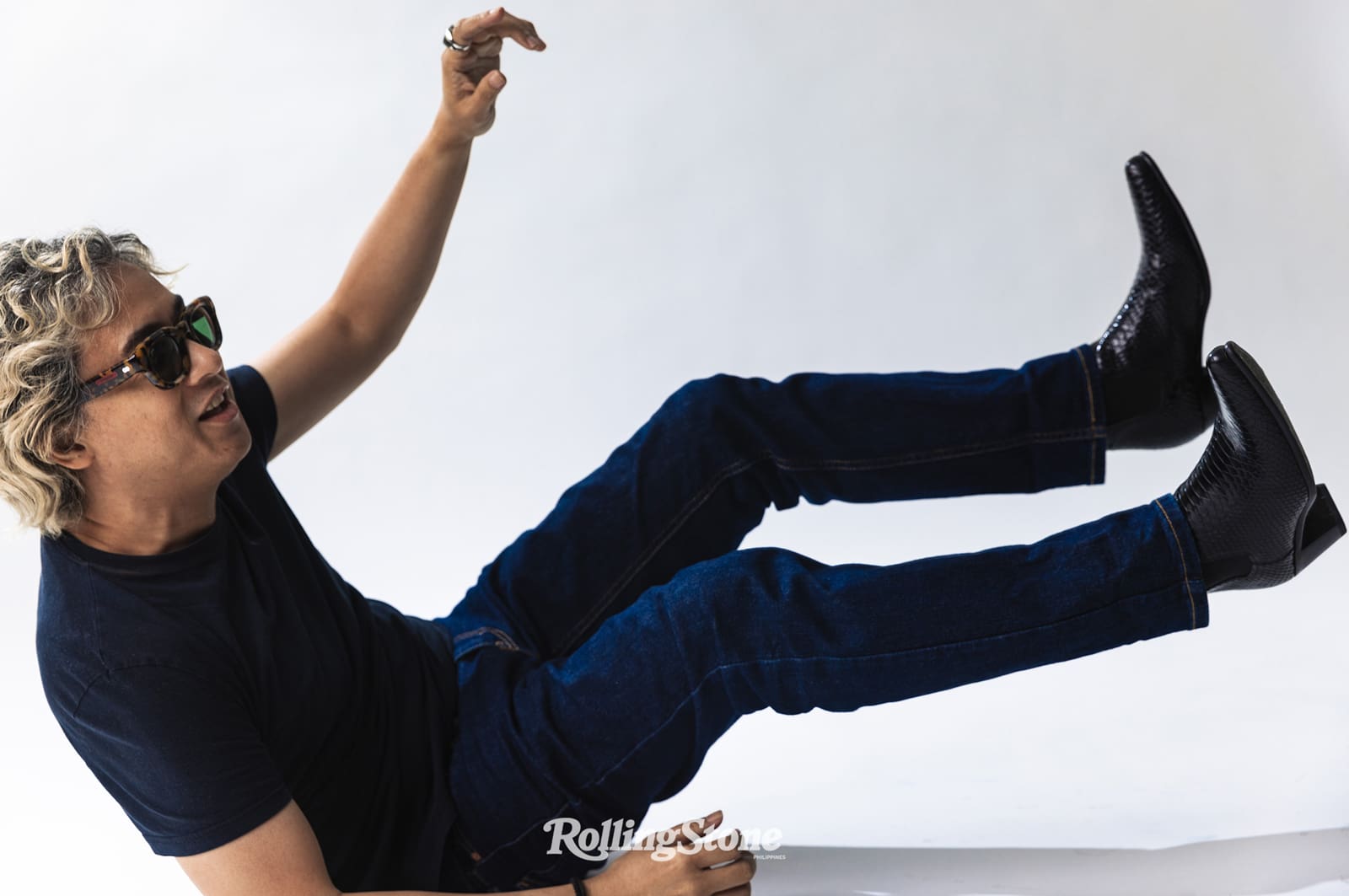
The subject matter was very contemporary for its time, yet he found a way to make it feel fresh and suspenseful.
Definitely. You’re talking about the way you want to know what happens next even though you kind of know the story na. It’s still surprising, the way he stages scenes and how that movie flows. It’s really a masterclass in directing.
So, there’s this Monster Radio interview you did in 1993…
Woah, where did you dig that up?
… And the host was asking, “Where did you get the name ‘Eraserheads’?” It was either you or someone else from the band who said that you guys got it from a magazine — you needed a name for the band — and that Eraserhead [by David Lynch] was this “boring, black and white film.” How do you feel about Eraserhead as a film now? Have you revisited it since 1993?
I have so much respect for the film now. I don’t know who said that. Maybe it was me, maybe it was the other guys, because they weren’t into that kind of thing. But at that time, I thought it was a curiosity and sort of an initiation. If you’re a fan of film, you have to watch this. And you have to like it. But at the time, I didn’t like it because it made me feel strange. I didn’t want to feel strange. But I have so much respect for it. It’s really one of the most amazing debut films by a director. There’s no one like [David Lynch]. His films… It’s so dreamy and nightmarish at the same time. It’s really hard to pin down. It’s not that I want to be like that. It’s just something I really admire and am fascinated by. And, siguro alam mo, even George Lucas was impressed with [Eraserhead] that he wanted Lynch to direct the third Star Wars.
But he ended up doing Dune.
He ended up doing Dune! Oh my god, I can talk for hours.
Sometimes, there are nuggets you encounter in life — whether that’s a favourite film, or you name something — and its meaning evolves as you carry that thing with you. Given you had this initial reaction to Eraserhead, did the movie seep into your purpose as an artist? Were you taking bits from the movie and finding wisdom to carry through your work?
I guess I wouldn’t have named the band Eraserheads if I didn’t respond to the movie or Lynch somehow. I enjoy surrealism and dreamy stuff — that kind of atmosphere where you don’t really know what you’re looking at or what you’re listening to. I hope it permeates sa songs.
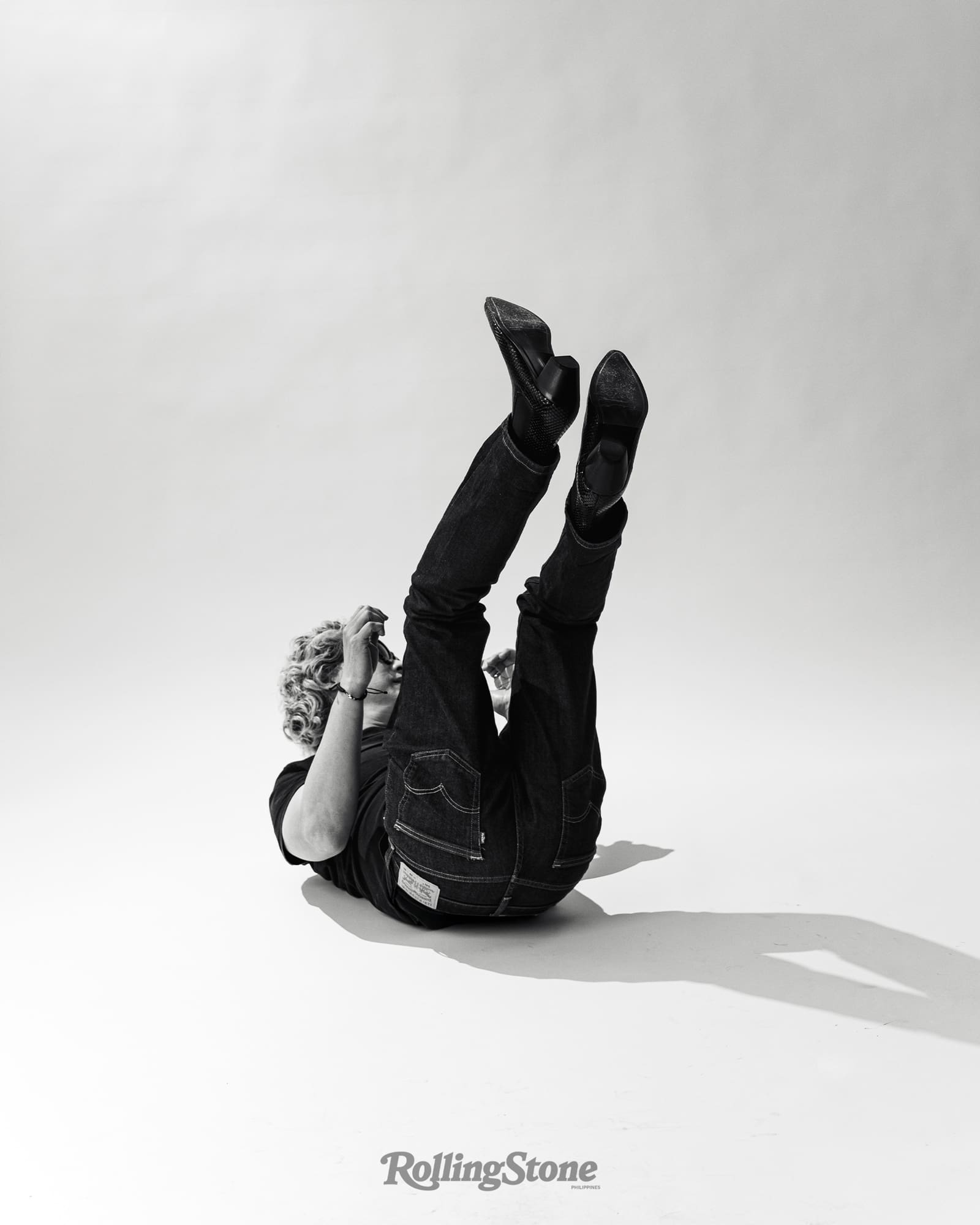
In your press release for [your single] “Bulaklak sa Buwan,” it said you were watching a lot of documentaries at the time [you were writing the song]. By any chance were you watching moon landing documentaries? Because I think there’s a parallel.
Well, I came across that conspiracy theory through [the documentary about] The Shining — which I assume you’ve already seen — and how Kubrick filmed the moon landing. That also struck me as really fascinating. Of all the conspiracy theories, I think that’s the one I’m most likely to believe — that it was all political, it was all for show, so the [United States] can upstage [the Soviet Union]. I wouldn’t put it past them to do something like that.
But going back to “Bulaklak”… I guess, at the back of my mind, I was thinking about illusions and delusions in life. Another thing I’m super interested in is the cult of personality — basically, cults. I watch a lot of those. I’m not anti-religion, but I do think religion is mostly harmful to people and civilization. It’s holding us back. That’s one thing I tried to touch on in the song.
Is it the crazed belief for something?
Yeah, the blind faith is really dangerous. And you can see that. It’s all over the news. I think, historically, blind faith is the number one cause of suffering.
Without using genres, how would you describe your sound as an artist? I’d like you to try and describe it in its essence and quality.
I have to take my time here. It’s hard to define something… My music would be a cross… between the past and the future… That’s the only way I can put it.
Do you feel like your sound is attached to who you are as a person on an everyday level when you’re not being an artist, when you’re Ely Buendia, the person who has a home to go back to everyday?
Yes. That’s what I had to grapple with in the solo material. You can’t help it. I mean, I don’t do this for my own entertainment. I want to reach as many new people as possible. And the only way to do that is to give [audiences] something they’ve already loved in the beginning, and add something new. In my case, new instrumentation, new arrangements. I hope I was successful with this album.
It’s interesting you say that your purpose as an artist is to reach as many people as possible. There are other artists who disregard the audience and set out to say something on their own. How do you resonate with more people while saying what you want to say in an unfiltered way?
I think the operative word for me is balance. I really respect artists who are there for the sake of art. But for me, the goal is not to perpetuate art or taste, but to contribute to someone else’s life and hopefully get back something in return.
What do you want to get back in return?
Money. [Laughs] No, the feeling that we’re not alone and not so different after all. ‘Yong gano’n lang. That’s all I really want.
[I] was looking at my profile on Spotify and seeing I only had 5,000 listeners and a couple songs to my name. I found that really sad and ironic — that I’m known to have written a lot of really good songs, and I haven’t represented myself.
Earlier, you were talking about [Original Pilipino Music] and how it was really your entry point into music. Do you feel that OPM is a loaded term?
That question is loaded. [Laughs]
What is OPM, anyway?
When it comes to that kind of question or discussion, I tend to just simplify it. To me, OPM doesn’t define any era at all. It’s just a convenient term for music made by Filipinos.
But is there a sound that captures it?
You’re talking about the Manila sound. I think that would be the most specific term when talking about an actual sound. It’s like yacht rock. Filipinos love that sound. That’s why it was so popular in the ‘70s. It defined the ‘70s even more than disco, which was prevalent in the Western world at the time.
So, what is the Manila sound?
It’s really smooth. There’s a chill vibe. I think the avatars of Manila sound would be Hotdog, Rey Valera, VST & Company…
Manila, as a city… There’s so much going on. It’s a concrete jungle. It’s sort of like the Wild West, in a way. Some people love it, some people hate it. How do you make sense of those conflicting energies: the Manila sound being smooth and chill, and the city being very gritty?
I think it makes sense. When you get home from work, having spent the whole day outside in that jungle — all that noise and stress — you just want to listen to something chill with a positive vibe. Filipinos crave that. I wouldn’t say they’re saps. But they gravitate towards that because it’s a release. It’s an escape. I think that goes further back in history, doon sa mga kundiman songs, because we were a rural country. We’re not at all accustomed to the Western, fast-paced style of living. We’re island people. Even though we are cosmopolitan now, hindi nagbabago ang taste natin when it comes to enjoying music, or even movies. We love dramas and sentimental stuff. That’s just who we are. Even our “theme song” of the revolution [“Jocelynan Baliwag”] was not a march. It wasn’t an upbeat cry to battle type of song. It’s a slow, acoustic ballad. I learned that song when I was in Lav Diaz’s film [A Lullaby To The Sorrowful Mystery]. It was a classical piece. I was shocked to learn that this was the song of the revolution. It makes you want to lie down and sleep.
You’ve mentioned in previous interviews that you were experiencing a mild writer’s block before writing Method Adaptor, and that you needed to figure out “how to be creative again.” How did you find out how to be creative again?
I had to want it, first and foremost. I lacked the initiative or willpower to actually do something. Because I’m comfortable as is. I don’t need to go through all that — especially, no offense, marketing and doing interviews. Recording is also hard. I spent many sleepless nights…
Anyway, I had to want it. [Method Adaptor] came about because I wanted to go inside Abbey Road [Studios]. So, I went to London to chaperone Ena Mori on her trip and I really want to go see Abbey Road. But the first time I was there — and this was with the Eheads — they wouldn’t let us in because they don’t allow tourists. You have to have business there. So I said, “Okay, I’ll just book myself studio time.” And that was the catalyst. I had to come up with a song so I can record at Abbey Road. And I did. I recorded two songs there: “Deadbeat [Creeper]” and “Kandarapa.” When I got back home, I said, “I have two songs in the can. Might as well make an album.” And that was it.
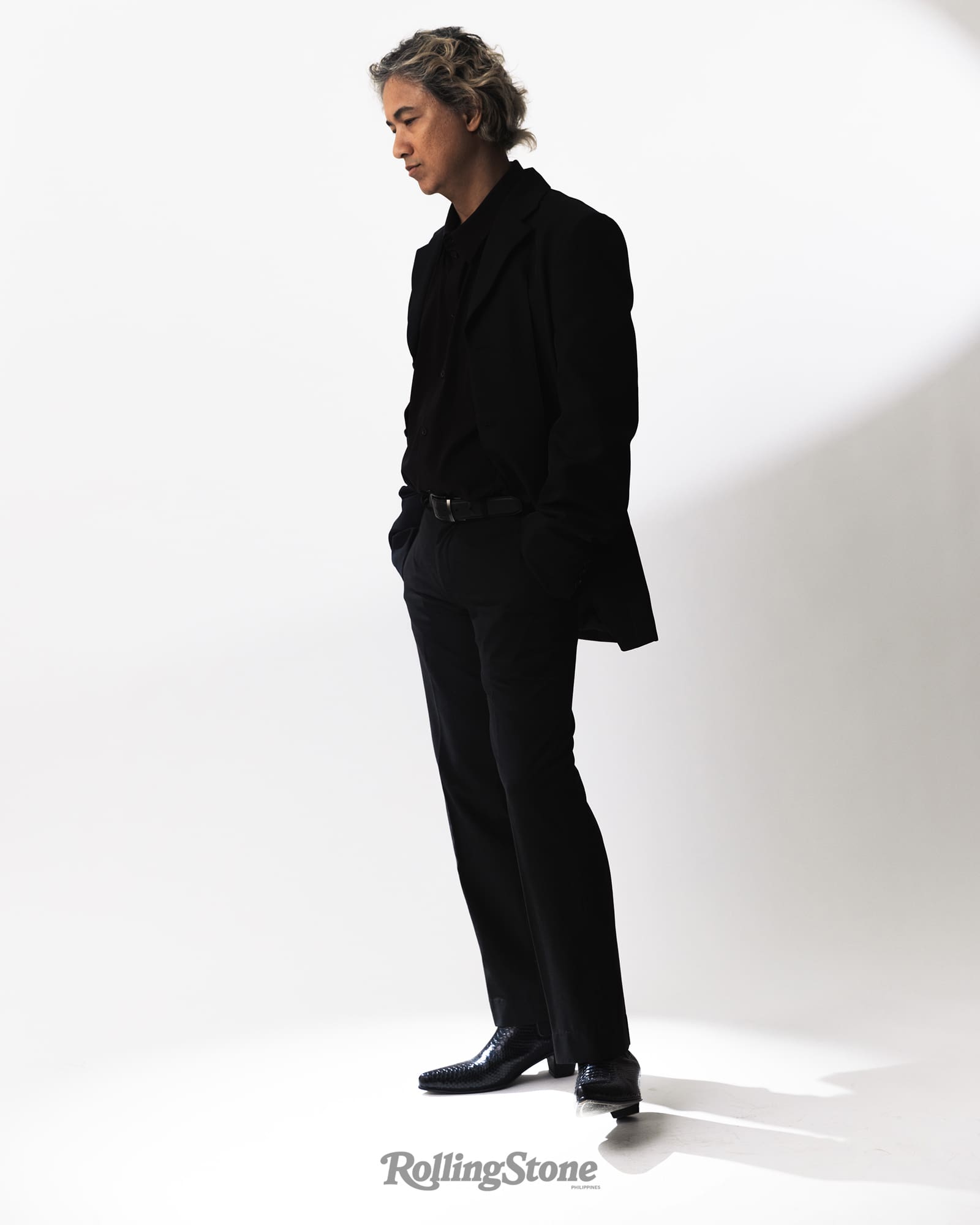
Are you one of those writers who believe that writing is actually a painful process, or do you enjoy the process?
I think if you enjoy it, you’d be a masochist. It’s really painful. I’d rather not write at all. Back then, it was enjoyable because the ideas just flowed. There was no time to sit down and enjoy the fruits of your labor. You had to record another track because you wanted to, and you wanted to hear that track recorded. But it’s different now. I don’t have those wants anymore, especially after 10, 15 albums. Plus, I also thought I didn’t have it in me anymore. That self doubt everyone goes through after being out of circulation for so long — I really needed to want to face that. To me, it just wasn’t worth it.
So, Abbey Road was one reason that got me creative again. Another one was looking at my profile on Spotify and seeing I only had 5,000 listeners and a couple songs to my name. I found that really sad and ironic — that I’m known to have written a lot of really good songs, and I haven’t represented myself. That was also one of the reasons that spurred me to be creative again.
Did you feel you couldn’t write because the things you were thinking about were too complicated to articulate?
Exactly. That’s how I felt. There were only two choices: To write something I knew would instantly get me back in the good graces of the fans — especially the Eheads fans, who have been so, so, critical — or write something I could be proud of, and resonate with the person I am now.
Of course, I chose the latter. But when I looked at how hard it would be to write something like that, in terms of the emotional toll, I almost gave up. I said, “No, I’m not doing another album.” But between that and the other choice, which is to go back to what I can easily do, that also wasn’t an option. Doing the latter choice was a legacy type of thing. Like, okay, if I am going to do a solo album, it would have to define me. I can just leave it at that, and I’d be satisfied.
You’ve mentioned how the title of Method Adaptor alludes to your songwriting process and how you dug deeper than you usually do, but how it’s also a play on the term “method actor.” What is it about method acting that you brought into Method Adaptor? Did you have to sacrifice yourself?
I had to relive past traumas and stuff that I’d rather not speak of, especially in public. Though I try my best to do it with metaphors and symbolism.
That’s very Lynchian of you.
[Laughs] Thank you. But yeah, this was the most emotionally taxing songwriting I’ve ever done.
That’s something I wanted to overcome with this album — to just stand on my own and be responsible for it being a failure or being a success.
You’ve also mentioned that songwriting in Tagalog is quite limiting compared to English. What did you mean by that?
In terms of vocabulary, there’s only so much you can say in Tagalog. Almost all those words don’t really “sound” good. Unlike English, you can say a lot of things and it can sound really good. Even banal stuff sounds good. I think the best example of how English is the most preferable language in terms of music is ABBA, who are well known in their own country but choose to speak English because they said it was more sonorous. I tend to agree. It’s easier for me to write in English. Sometimes, I have to write in English first and translate it to Tagalog.
I’d say Tagalog is a more intuitive language, which is reflective of Filipinos who respond more to emotion. We’re sentimental people. And English feels more rational and eloquent in that way where you can say what you really mean.
It’s sad because that wasn’t always the case. I mean, back in the day — during my time in the ‘70s, ‘80s — English OPM songs were side-by-side with Tagalog songs, and they would resonate with people as much as the Tagalog ones. I mean, take Jose Mari Chan, for example, who writes exclusively in English. Of course, he’s very sentimental too. But lately lang na parang English has had a bad rep with people.
In what way?
I don’t know. They don’t like it. They don’t like hearing English in conversation, especially in songs. I’ve had a lot of feedback from fans na, “Ba’t ka nag-su-sulat ng English? Mas gusto namin ‘yong Tagalog.” The news is another example. Back then, news was almost exclusively in English. Lately na lang naging Tagalog lahat. It’s just sad because we have that advantage over other Asian countries. We’re very fluent and we can understand. But the media has pervaded this notion that English is bad and it’s connected to [a level of education]. I think that’s what people don’t like. It’s this sort of elitist thing. There’s this smart shaming going on just because you can speak English.
There’s another side to that point with the extinction of some Filipino languages. Perhaps the reason why people want to hear you speak and sing in Tagalog is because there’s a reclaiming of ownership that’s happening amongst your audiences. Like, there’s no need to filter the way you talk.
You have a point there. That might be what’s going on. And you can’t discount the fact that I did make my name through those Tagalog songs. And that’s what they respond to.
Do you have a songwriting pet peeve?
I hate it when songwriters ruin a great melody by writing lyrics that are inconsequential or mindless, like The Beatles’ “Because,” or the chorus of a-ha’s “Take on Me”.
Have you ever faced disillusionment in your music career?
Oh, yeah. When you’re trying to make something substantial and, at that moment, you finally realize what a good song is — and you know how to do it, and you actually do it… You’re satisfied with it, but they just dismiss it. That was the point of my disillusionment. That happened during Eheads time pa lang. We tried to make something very experimental and progressive after the success of Cutterpillow and “Ang Huling El Bimbo.” It was met with silence. That was bad.
You mentioned in your listening party [for Method Adaptor] that, after more than 30 years, you finally want to take credit for yourself. Do you ever feel this push and pull between [being in a band], and pursuing your own artistry?
I don’t like the thought of being alone on stage. So, I’ve always collaborated with people. Even in filmmaking, I’ve never done solo work. The one film I did, Bang Bang Alley, was an anthology and I had two other directors with me. It’s just not something I’m confident about. Maybe that comes from my upbringing. That’s something I wanted to overcome with this album — to just stand on my own and be responsible for it being a failure or being a success.
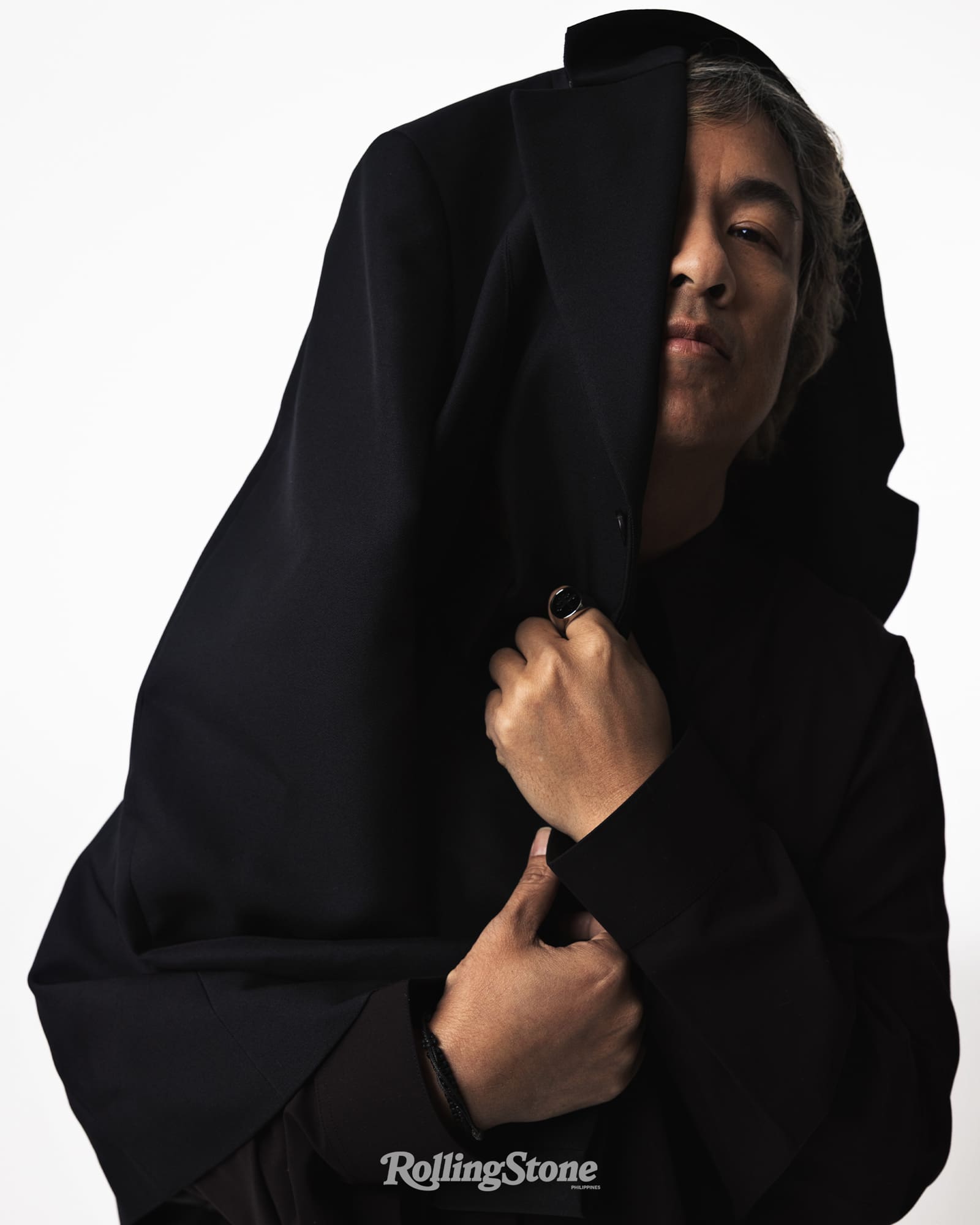
There are some artists who have a criteria of what they want to do and how they will pursue it. But there are other artists who always think about the people around them. So, is it in your character to be surrounded by other people?
Definitely in my character. I mean, I know what I want. As a matter of fact, that’s what bugged me about being in a band — that I had to answer to my other bandmates and get their approval when, in fact, I could have easily played all the instruments myself. But that was the balance I needed to [achieve] if I wanted to be in a band, but also push my own artistry.
On the one hand, you say you have no expectations for Method Adaptor because you created it for yourself. But you’ve also said that the stakes have never been higher. How do you reconcile those two different feelings?
I tend to contradict myself in interviews. That’s because I can’t make up my mind. Sometimes I feel this way one day, and another day [it’s different]. I did not put anyone’s taste in mind, especially not the fans. I don’t think they know what I’m really capable of. They’re just riding a wave of nostalgia every time they hear my name. But on the other hand, the stakes are high for me because I may not have that much juice anymore. I’ve spent it all. This is all in. I’ve spent it all on this album. To be rejected again by the fans or the industry would be shattering for me. It’s really like the first one, [Ultraelectromagneticpop!], in that there was so much riding on that because I wanted it to be my career. And if that album failed, it was going to be a desk job or whatever. I feel the same way now. Like, if this didn’t do well in terms of at least positive response from anyone, I’d have to go back to my job as a mentor and CEO, which is not bad. I mean, I enjoy it, really. I was quite content doing that job.
This contradiction you’re experiencing — that’s Method Adaptor, isn’t it? Accepting contradicting things that are happening at the same time.
[Laughs] Yeah, it is.
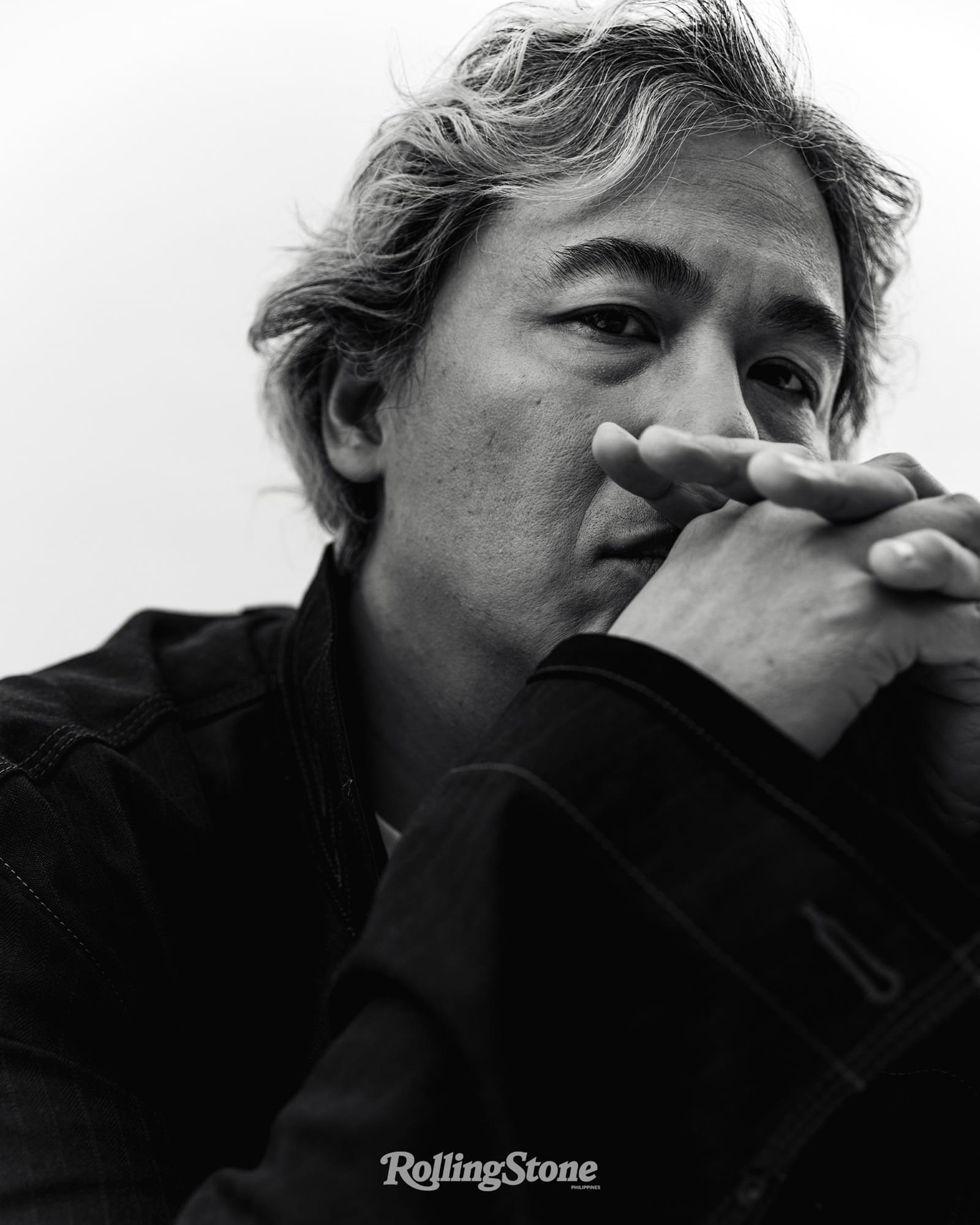
You entered this music thing as a young outsider. Over the years, you’ve gained insider access to the thing you once aspired to. Back then, maybe you had certain expectations, or things you didn’t believe in necessarily. Maybe some of those things you’ve internalized. Do you ever look back at your younger self and remember those things you resented, but later grew an understanding for?
I think the whole project relates to my current state. My [emotions], my mind. This couldn’t have happened two or three years ago when I was still carrying so much weight, in terms of the past. I had an epiphany where the only person who could help me was myself. That’s what I set out to do. I went on a road of healing in terms of the people who I thought hurt me. That came at the right time, I think. Because no one was really doing anything about it. I was still feeling guilt, I was still feeling pain. I was still feeling remorse and anger towards everything. I wouldn’t have written as good as this if I decided to write during that time. Not to say that this album doesn’t contain any resentment or anger, because it does. But that’s my way of purging all those thoughts.
I’ll end with a palette cleanser. So, if Method Adaptor were to become a film, what kind of film would it be?
It’d be a sci-fi musical.
Do you have a plot in mind?
Yes, I do. I think about these things at the back of my head, like, “Ah, this would make a good scene!”
What’s the film plot of Method Adaptor?
It would be in the future where Jesus finally decides to return and no one knows who he is. Like, people accepted that all the stories in the Bible are fiction.
Who would play Jesus?
Me!
Makeup artist PAM ROBES
Hairstylist PATTY CRISTOBAL
Photographer’s assistant JOEY ALVERO
Ely wears Comme Des Garçons Homme Plus suit
Junya Watanabe MAN jacket
Kiko Kostadinov jacket
Helmut Lang shirt All from UNIVERS One Rockwell
Lemaire pants from homme et femme 8 Rockwell
Akila sunglasses from Ronnie And Joe
Fortune W.W.D. denim jacket

